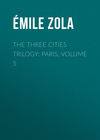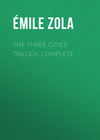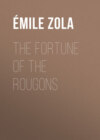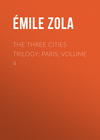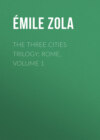Read the book: «The Three Cities Trilogy: Paris, Volume 5», page 5
Pierre and Thomas looked at one another, pale and quivering. And all at once, as the cries ceased and the pavilion sank into death-like silence once more, the latter said in an undertone: "She is usually very gentle, she will sometimes spend whole days sitting on a carpet like a little child. He is fond of her when she is like that; he lays her down and picks her up, caresses her and makes her laugh as if she were a baby. Ah! how dreadfully sad it is! When an attack comes upon her she gets frantic, tries to bite herself, and kill herself by throwing herself against the walls. And then he has to struggle with her, for no one else is allowed to touch her. He tries to restrain her, and holds her in his arms to calm her… But how terrible it was just now! Did you hear? I do not think she has ever had such a frightful attack before."
For a quarter of an hour longer profound silence prevailed. Then Grandidier came out of the pavilion, bareheaded and still ghastly pale. Passing the little glazed work-shop on his way, he perceived Thomas and Pierre there, and at once came in. But he was obliged to lean against a bench like a man who is dazed, haunted by a nightmare. His good-natured, energetic face retained an expression of acute anguish; and his left ear was scratched and bleeding. However, he at once wished to talk, overcome his feelings, and return to his life of activity. "I am very pleased to see you, my dear Thomas," said he, "I have been thinking over what you told me about our little motor. We must go into the matter again."
Seeing how distracted he was, it occurred to the young man that some sudden diversion, such as the story of another's misfortunes, might perhaps draw him from his haunting thoughts. "Of course I am at your disposal," he replied; "but before talking of that matter I should like to tell you that we have just seen Toussaint, that poor old fellow who has been stricken with paralysis. His awful fate has quite distressed us. He is in the greatest destitution, forsaken as it were by the roadside, after all his years of labour."
Thomas dwelt upon the quarter of a century which the old workman had spent at the factory, and suggested that it would be only just to take some account of his long efforts, the years of his life which he had devoted to the establishment. And he asked that he might be assisted in the name both of equity and compassion.
"Ah! monsieur," Pierre in his turn ventured to say. "I should like to take you for an instant into that bare room, and show you that poor, aged, worn-out, stricken man, who no longer has even the power of speech left him to tell people his sufferings. There can be no greater wretchedness than to die in this fashion, despairing of all kindliness and justice."
Grandidier had listened to them in silence. But big tears had irresistibly filled his eyes, and when he spoke it was in a very low and tremulous voice: "The greatest wretchedness, who can tell what it is? Who can speak of it if he has not known the wretchedness of others? Yes, yes, it's sad undoubtedly that poor Toussaint should be reduced to that state at his age, not knowing even if he will have food to eat on the morrow. But I know sorrows that are just as crushing, abominations which poison one's life in a still greater degree… Ah! yes, food indeed! To think that happiness will reign in the world when everybody has food to eat! What an idiotic hope!"
The whole grievous tragedy of his life was in the shudder which had come over him. To be the employer, the master, the man who is making money, who disposes of capital and is envied by his workmen, to own an establishment to which prosperity has returned, whose machinery coins gold, apparently leaving one no other trouble than that of pocketing one's profits; and yet at the same time to be the most wretched of men, to know no day exempt from anguish, to find each evening at one's hearth no other reward or prop than the most atrocious torture of the heart! Everything, even success, has to be paid for. And thus that triumpher, that money-maker, whose pile was growing larger at each successive inventory, was sobbing with bitter grief.
However, he showed himself kindly disposed towards Toussaint, and promised to assist him. As for a pension that was an idea which he could not entertain, as it was the negation of the wage-system such as it existed. He energetically defended his rights as an employer, repeating that the strain of competition would compel him to avail himself of them so long as the present system should endure. His part in it was to do good business in an honest way. However, he regretted that his men had never carried out the scheme of establishing a relief fund, and he said that he would do his best to induce them to take it in hand again.
Some colour had now come back to his checks; for on returning to the interests of his life of battle he felt his energy restored. He again reverted to the question of the little motor, and spoke of it for some time with Thomas, while Pierre waited, feeling quite upset. Ah! he thought, how universal was the thirst for happiness! Then, in spite of the many technical terms that were used he caught a little of what the others were saying. Small steam motors had been made at the works in former times; but they had not proved successes. In point of fact a new propelling force was needed. Electricity, though everyone foresaw its future triumph, was so far out of the question on account of the weight of the apparatus which its employment necessitated. So only petroleum remained, and the inconvenience attaching to its use was so great that victory and fortune would certainly rest with the manufacturer who should be able to replace it by some other hitherto unknown agent. In the discovery and adaptation of the latter lay the whole problem.
"Yes, I am eager about it now," at last exclaimed Grandidier in an animated way. "I allowed you to prosecute your experiments without troubling you with any inquisitive questions. But a solution is becoming imperative."
Thomas smiled: "Well, you must remain patient just a little longer," said he; "I believe that I am on the right road."
Then Grandidier shook hands with him and Pierre, and went off to make his usual round through his busy, bustling works, whilst near at hand, awaiting his return, stood the closed pavilion, where every evening he was fated to relapse into endless, incurable anguish.
The daylight was already waning when Pierre and Thomas, after re-ascending the height of Montmartre, walked towards the large work-shop which Jahan, the sculptor, had set up among the many sheds whose erection had been necessitated by the building of the Sacred Heart. There was here a stretch of ground littered with materials, an extraordinary chaos of building stone, beams and machinery; and pending the time when an army of navvies would come to set the whole place in order, one could see gaping trenches, rough flights of descending steps and fences, imperfectly closing doorways which conducted to the substructures of the basilica.
Halting in front of Jahan's work-shop, Thomas pointed to one of these doorways by which one could reach the foundation works. "Have you never had an idea of visiting the foundations?" he inquired of Pierre. "There's quite a city down there on which millions of money have been spent. They could only find firm soil at the very base of the height, and they had to excavate more than eighty shafts, fill them with concrete, and then rear their church on all those subterranean columns… Yes, that is so. Of course the columns cannot be seen, but it is they who hold that insulting edifice aloft, right over Paris!"
Having drawn near to the fence, Pierre was looking at an open doorway beyond it, a sort of dark landing whence steps descended as if into the bowels of the earth. And he thought of those invisible columns of concrete, and of all the stubborn energy and desire for domination which had set and kept the edifice erect.
Thomas was at last obliged to call him. "Let us make haste," said he, "the twilight will soon be here. We shan't be able to see much."
They had arranged to meet Antoine at Jahan's, as the sculptor wished to show them a new model he had prepared. When they entered the work-shop they found the two assistants still working at the colossal angel which had been ordered for the basilica. Standing on a scaffolding they were rough-hewing its symmetrical wings, whilst Jahan, seated on a low chair, with his sleeves rolled up to his elbows, and his hands soiled with clay, was contemplating a figure some three feet high on which he had just been working.
"Ah! it's you," he exclaimed. "Antoine has been waiting more than half an hour for you. He's gone outside with Lise to see the sun set over Paris, I think. But they will soon be back."
Then he relapsed into silence, with his eyes fixed on his work.
This was a bare, erect, lofty female figure, of such august majesty, so simple were its lines, that it suggested something gigantic. The figure's abundant, outspread hair suggested rays around its face, which beamed with sovereign beauty like the sun. And its only gesture was one of offer and of greeting; its arms were thrown slightly forward, and its hands were open for the grasp of all mankind.
Still lingering in his dream Jahan began to speak slowly: "You remember that I wanted a pendant for my figure of Fecundity. I had modelled a Charity, but it pleased me so little and seemed so commonplace that I let the clay dry and spoil… And then the idea of a figure of Justice came to me. But not a gowned figure with the sword and the scales! That wasn't the Justice that inspired me. What haunted my mind was the other Justice, the one that the lowly and the sufferers await, the one who alone can some day set a little order and happiness among us. And I pictured her like that, quite bare, quite simple, and very lofty. She is the sun as it were, a sun all beauty, harmony and strength; for justice is only to be found in the sun which shines in the heavens for one and all, and bestows on poor and rich alike its magnificence and light and warmth, which are the source of all life. And so my figure, you see, has her hands outstretched as if she were offering herself to all mankind, greeting it and granting it the gift of eternal life in eternal beauty. Ah! to be beautiful and strong and just, one's whole dream lies in that."
Jahan relighted his pipe and burst into a merry laugh. "Well, I think the good woman carries herself upright… What do you fellows say?"
His visitors highly praised his work. Pierre for his part was much affected at finding in this artistic conception the very idea that he had so long been revolving in his mind – the idea of an era of Justice rising from the ruins of the world, which Charity after centuries of trial had failed to save.
Then the sculptor gaily explained that he had prepared his model there instead of at home, in order to console himself a little for his big dummy of an angel, the prescribed triteness of which disgusted him. Some fresh objections had been raised with respect to the folds of the robe, which gave some prominence to the thighs, and in the end he had been compelled to modify all of the drapery.
"Oh! it's just as they like!" he cried; "it's no work of mine, you know; it's simply an order which I'm executing just as a mason builds a wall. There's no religious art left, it has been killed by stupidity and disbelief. Ah! if social or human art could only revive, how glorious to be one of the first to bear the tidings!"
Then he paused. Where could the youngsters, Antoine and Lise, have got to, he wondered. He threw the door wide open, and, a little distance away, among the materials littering the waste ground, one could see Antoine's tall figure and Lise's short slender form standing out against the immensity of Paris, which was all golden amidst the sun's farewell. The young man's strong arm supported Lise, who with this help walked beside him without feeling any fatigue. Slender and graceful, like a girl blossoming into womanhood, she raised her eyes to his with a smile of infinite gratitude, which proclaimed that she belonged to him for evermore.
"Ah! they are coming back," said Jahan. "The miracle is now complete, you know. I'm delighted at it. I did not know what to do with her; I had even renounced all attempts to teach her to read; I left her for days together in a corner, infirm and tongue-tied like a lack-wit… But your brother came and took her in hand somehow or other. She listened to him and understood him, and began to read and write with him, and grow intelligent and gay. Then, as her limbs still gained no suppleness, and she remained infirm, ailing and puny, he began by carrying her here, and then helped her to walk in such wise that she can now do so by herself. In a few weeks' time she has positively grown and become quite charming. Yes, I assure you, it is second birth, real creation. Just look at them!"
Antoine and Lise were still slowly approaching. The evening breeze which rose from the great city, where all was yet heat and sunshine, brought them a bath of life. If the young man had chosen that spot, with its splendid horizon, open to the full air which wafted all the germs of life, it was doubtless because he felt that nowhere else could he instil more vitality, more soul, more strength into her. And love had been created by love. He had found her asleep, benumbed, without power of motion or intellect, and he had awakened her, kindled life in her, loved her, that he might be loved by her in return. She was his work, she was part of himself.
"So you no longer feel tired, little one?" said Jahan.
She smiled divinely. "Oh! no, it's so pleasant, so beautiful, to walk straight on like this… All I desire is to go on for ever and ever with Antoine."
The others laughed, and Jahan exclaimed in his good-natured way: "Let us hope that he won't take you so far. You've reached your destination now, and I shan't be the one to prevent you from being happy."
Antoine was already standing before the figure of Justice, to which the falling twilight seemed to impart a quiver of life. "Oh! how divinely simple, how divinely beautiful!" said he.
For his own part he had lately finished a new wood engraving, which depicted Lise holding a book in her hand, an engraving instinct with truth and emotion, showing her awakened to intelligence and love. And this time he had achieved his desire, making no preliminary drawing, but tackling the block with his graver, straight away, in presence of his model. And infinite hopefulness had come upon him, he was dreaming of great original works in which the whole period that he belonged to would live anew and for ever.
Thomas now wished to return home. So they shook hands with Jahan, who, as his day's work was over, put on his coat to take his sister back to the Rue du Calvaire.
"Till to-morrow, Lise," said Antoine, inclining his head to kiss her.
She raised herself on tip-toes, and offered him her eyes, which he had opened to life. "Till to-morrow, Antoine," said she.
Outside, the twilight was falling. Pierre was the first to cross the threshold, and as he did so, he saw so extraordinary a sight that for an instant he felt stupefied. But it was certain enough: he could plainly distinguish his brother Guillaume emerging from the gaping doorway which conducted to the foundations of the basilica. And he saw him hastily climb over the palings, and then pretend to be there by pure chance, as though he had come up from the Rue Lamarck. When he accosted his two sons, as if he were delighted to meet them, and began to say that he had just come from Paris, Pierre asked himself if he had been dreaming. However, an anxious glance which his brother cast at him convinced him that he had been right. And then he not only felt ill at ease in presence of that man whom he had never previously known to lie, but it seemed to him that he was at last on the track of all he had feared, the formidable mystery that he had for some time past felt brewing around him in the little peaceful house.
When Guillaume, his sons and his brother reached home and entered the large workroom overlooking Paris, it was so dark that they fancied nobody was there.
"What! nobody in?" said Guillaume.
But in a somewhat low, quiet voice Francois answered out of the gloom: "Why, yes, I'm here."
He had remained at his table, where he had worked the whole afternoon, and as he could no longer read, he now sat in a dreamy mood with his head resting on his hands, his eyes wandering over Paris, where night was gradually falling. As his examination was now near at hand, he was living in a state of severe mental strain.
"What, you are still working there!" said his father. "Why didn't you ask for a lamp?"
"No, I wasn't working, I was looking at Paris," Francois slowly answered. "It's singular how the night falls over it by degrees. The last district that remained visible was the Montague Ste. Genevieve, the plateau of the Pantheon, where all our knowledge and science have grown up. A sun-ray still gilds the schools and libraries and laboratories, when the low-lying districts of trade are already steeped in darkness. I won't say that the planet has a particular partiality for us at the Ecole Normale, but it's certain that its beams still linger on our roofs, when they are to be seen nowhere else."
He began to laugh at his jest. Still one could see how ardent was his faith in mental effort, how entirely he gave himself to mental labour, which, in his opinion, could alone bring truth, establish justice and create happiness.
Then came a short spell of silence. Paris sank more and more deeply into the night, growing black and mysterious, till all at once sparks of light began to appear.
"The lamps are being lighted," resumed Francois; "work is being resumed on all sides."
Then Guillaume, who likewise had been dreaming, immersed in his fixed idea, exclaimed: "Work, yes, no doubt! But for work to give a full harvest it must be fertilised by will. There is something which is superior to work."
Thomas and Antoine had drawn near. And Francois, as much for them as for himself, inquired: "What is that, father?"
"Action."
For a moment the three young men remained silent, impressed by the solemnity of the hour, quivering too beneath the great waves of darkness which rose from the vague ocean of the city. Then a young voice remarked, though whose it was one could not tell: "Action is but work."
And Pierre, who lacked the respectful quietude, the silent faith, of his nephews, now felt his nervousness increasing. That huge and terrifying mystery of which he was dimly conscious rose before him, while a great quiver sped by in the darkness, over that black city where the lamps were now being lighted for a whole passionate night of work.
IV
THE CRISIS
A GREAT ceremony was to take place that day at the basilica of the Sacred Heart. Ten thousand pilgrims were to be present there, at a solemn consecration of the Holy Sacrament; and pending the arrival of four o'clock, the hour fixed for the service, Montmartre would be invaded by people. Its slopes would be black with swarming devotees, the shops where religious emblems and pictures were sold would be besieged, the cafes and taverns would be crowded to overflowing. It would all be like some huge fair, and meantime the big bell of the basilica, "La Savoyarde," would be ringing peal on peal over the holiday-making multitude.
When Pierre entered the workroom in the morning he perceived Guillaume and Mere-Grand alone there; and a remark which he heard the former make caused him to stop short and listen from behind a tall-revolving bookstand. Mere-Grand sat sewing in her usual place near the big window, while Guillaume stood before her, speaking in a low voice.
"Mother," said he, "everything is ready, it is for to-day."
She let her work fall, and raised her eyes, looking very pale. "Ah!" she said, "so you have made up your mind."
"Yes, irrevocably. At four o'clock I shall be yonder, and it will all be over."
"'Tis well – you are the master."
Silence fell, terrible silence. Guillaume's voice seemed to come from far away, from somewhere beyond the world. It was evident that his resolution was unshakable, that his tragic dream, his fixed idea of martyrdom, wholly absorbed him. Mere-Grand looked at him with her pale eyes, like an heroic woman who had grown old in relieving the sufferings of others, and had ever shown all the abnegation and devotion of an intrepid heart, which nothing but the idea of duty could influence. She knew Guillaume's terrible scheme, and had helped him to regulate the pettiest details of it; but if on the one hand, after all the iniquity she had seen and endured, she admitted that fierce and exemplary punishment might seem necessary, and that even the idea of purifying the world by the fire of a volcano might be entertained, on the other hand, she believed too strongly in the necessity of living one's life bravely to the very end, to be able, under any circumstances, to regard death as either good or profitable.
"My son," she gently resumed, "I witnessed the growth of your scheme, and it neither surprised nor angered me. I accepted it as one accepts lightning, the very fire of the skies, something of sovereign purity and power. And I have helped you through it all, and have taken upon myself to act as the mouthpiece of your conscience… But let me tell you once more, one ought never to desert the cause of life."
"It is useless to speak, mother," Guillaume replied: "I have resolved to give my life and cannot take it back… Are you now unwilling to carry out my desires, remain here, and act as we have decided, when all is over?"
She did not answer this inquiry, but in her turn, speaking slowly and gravely, put a question to him: "So it is useless for me to speak to you of the children, myself and the house?" said she. "You have thought it all over, you are quite determined?" And as he simply answered "Yes," she added: "'Tis well, you are the master… I will be the one who is to remain behind and act. And you may be without fear, your bequest is in good hands. All that we have decided together shall be done."
Once more they became silent. Then she again inquired: "At four o'clock, you say, at the moment of that consecration?"
"Yes, at four o'clock."
She was still looking at him with her pale eyes, and there seemed to be something superhuman in her simplicity and grandeur as she sat there in her thin black gown. Her glance, in which the greatest bravery and the deepest sadness mingled, filled Guillaume with acute emotion. His hands began to tremble, and he asked: "Will you let me kiss you, mother?"
"Oh! right willingly, my son," she responded. "Your path of duty may not be mine, but you see I respect your views and love you."
They kissed one another, and when Pierre, whom the scene had chilled to his heart, presented himself as if he were just arriving, Mere-Grand had quietly taken up her needlework once more, while Guillaume was going to and fro, setting one of his laboratory shelves in order with all his wonted activity.
At noon when lunch was ready, they found it necessary to wait for Thomas, who had not yet come home. His brothers Francois and Antoine complained in a jesting way, saying that they were dying of hunger, while for her part Marie, who had made a creme, and was very proud of it, declared that they would eat it all, and that those who came late would have to go without tasting it. When Thomas eventually put in an appearance he was greeted with jeers.
"But it wasn't my fault," said he; "I stupidly came up the hill by way of the Rue de la Barre, and you can have no notion what a crowd I fell upon. Quite ten thousand pilgrims must have camped there last night. I am told that as many as possible were huddled together in the St. Joseph Refuge. The others no doubt had to sleep in the open air. And now they are busy eating, here, there and everywhere, all over the patches of waste ground and even on the pavements. One can scarcely set one foot before the other without risk of treading on somebody."
The meal proved a very gay one, though Pierre found the gaiety forced and excessive. Yet the young people could surely know nothing of the frightful, invisible thing which to Pierre ever seemed to be hovering around in the bright sunlight of that splendid June day. Was it that the dim presentiment which comes to loving hearts when mourning threatens them, swept by during the short intervals of silence that followed the joyous outbursts? Although Guillaume looked somewhat pale, and spoke with unusual caressing softness, he retained his customary bright smile. But, on the other hand, never had Mere-Grand been more silent or more grave.
Marie's creme proved a great success, and the others congratulated her on it so fulsomely that they made her blush. Then, all at once, heavy silence fell once more, a deathly chill seemed to sweep by, making every face turn pale – even while they were still cleaning their plates with their little spoons.
"Ah! that bell," exclaimed Francois; "it is really intolerable. I can feel my head splitting."
He referred to "La Savoyarde," the big bell of the basilica, which had now begun to toll, sending forth deep sonorous volumes of sound, which ever and ever winged their flight over the immensity of Paris. In the workroom they were all listening to the clang.
"Will it keep on like that till four o'clock?" asked Marie.
"Oh! at four o'clock," replied Thomas, "at the moment of the consecration you will hear something much louder than that. The great peals of joy, the song of triumph will then ring out."
Guillaume was still smiling. "Yes, yes," said he, "those who don't want to be deafened for life had better keep their windows closed. The worst is, that Paris has to hear it whether it will or no, and even as far away as the Pantheon, so I'm told."
Meantime Mere-Grand remained silent and impassive. Antoine for his part expressed his disgust with the horrible religious pictures for which the pilgrims fought – pictures which in some respects suggested those on the lids of sweetmeat boxes, although they depicted the Christ with His breast ripped open and displaying His bleeding heart. There could be no more repulsive materialism, no grosser or baser art, said Antoine. Then they rose from table, talking at the top of their voices so as to make themselves heard above the incessant din which came from the big bell.
Immediately afterwards they all set to work again. Mere-Grand took her everlasting needlework in hand once more, while Marie, sitting near her, continued some embroidery. The young men also attended to their respective tasks, and now and again raised their heads and exchanged a few words. Guillaume, for his part, likewise seemed very busy; Pierre alone coming and going in a state of anguish, beholding them all as in a nightmare, and attributing some terrible meaning to the most innocent remarks. During dejeuner, in order to explain the frightful discomfort into which he was thrown by the gaiety of the meal, he had been obliged to say that he felt poorly. And now he was looking and listening and waiting with ever-growing anxiety.
Shortly before three o'clock, Guillaume glanced at his watch and then quietly took up his hat. "Well," said he, "I'm going out."
His sons, Mere-Grand and Marie raised their heads.
"I'm going out," he repeated, "au revoir."
Still he did not go off. Pierre could divine that he was struggling, stiffening himself against the frightful tempest which was raging within him, striving to prevent either shudder or pallor from betraying his awful secret. Ah! he must have suffered keenly; he dared not give his sons a last kiss, for fear lest he might rouse some suspicion in their minds, which would impel them to oppose him and prevent his death! At last with supreme heroism he managed to overcome himself.
"Au revoir, boys."
"Au revoir, father. Will you be home early?"
"Yes, yes… Don't worry about me, do plenty of work."
Mere-Grand, still majestically silent, kept her eyes fixed upon him. Her he had ventured to kiss, and their glances met and mingled, instinct with all that he had decided and that she had promised: their common dream of truth and justice.
"I say, Guillaume," exclaimed Marie gaily, "will you undertake a commission for me if you are going down by way of the Rue des Martyrs?"
"Why, certainly," he replied.
"Well, then, please look in at my dressmaker's, and tell her that I shan't go to try my gown on till to-morrow morning."
It was a question of her wedding dress, a gown of light grey silk, the stylishness of which she considered very amusing. Whenever she spoke of it, both she and the others began to laugh.
"It's understood, my dear," said Guillaume, likewise making merry over it. "We know it's Cinderella's court robe, eh? The fairy brocade and lace that are to make you very beautiful and for ever happy."
However, the laughter ceased, and in the sudden silence which fell, it again seemed as if death were passing by with a great flapping of wings and an icy gust which chilled the hearts of everyone remaining there.
"It's understood; so now I'm really off," resumed Guillaume. "Au revoir, children."
Then he sallied forth, without even turning round, and for a moment they could hear the firm tread of his feet over the garden gravel.
Pierre having invented a pretext was able to follow him a couple of minutes afterwards. As a matter of fact there was no need for him to dog Guillaume's heels, for he knew where his brother was going. He was thoroughly convinced that he would find him at that doorway, conducting to the foundations of the basilica, whence he had seen him emerge two days before. And so he wasted no time in looking for him among the crowd of pilgrims going to the church. His only thought was to hurry on and reach Jahan's workshop. And in accordance with his expectation, just as he arrived there, he perceived Guillaume slipping between the broken palings. The crush and the confusion prevailing among the concourse of believers favored Pierre as it had his brother, in such wise that he was able to follow the latter and enter the doorway without being noticed. Once there he had to pause and draw breath for a moment, so greatly did the beating of his heart oppress him.
